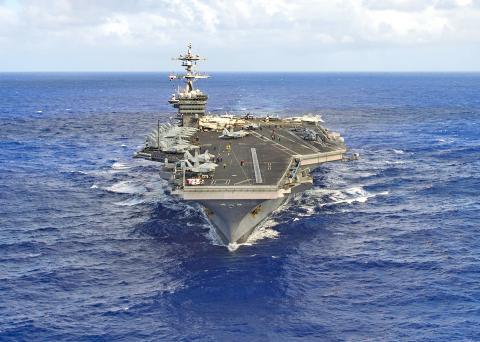The US Navy on Saturday said it had sent a carrier-led strike group to the Korean Peninsula in a show of force against North Korea’s “reckless” nuclear weapons program.
The move is expected to raise tensions in the region and comes hard on the heels of a US missile strike on Syria that was widely interpreted as putting Pyongyang on warning over its refusal to abandon its nuclear ambitions.
North Korea denounced Thursday’s strike as an act of “intolerable aggression” and one that justified “a million times over” the North’s push toward a credible nuclear deterrent.

PHOTO: REUTERS
“US Pacific Command ordered the Carl Vinson Strike Group north as a prudent measure to maintain readiness and presence in the Western Pacific,” said Commander Dave Benham, spokesman at US Pacific Command.
“The No. 1 threat in the region continues to be North Korea, due to its reckless, irresponsible and destabilizing program of missile tests and pursuit of a nuclear weapons capability,” he told reporters, in an unusually forceful statement.
Originally scheduled to make port calls in Australia, the strike group — which includes the Nimitz-class aircraft supercarrier USS Carl Vinson — is now headed from Singapore to the western Pacific Ocean.
Pyongyang is on a quest to develop a long-range missile capable of hitting the US mainland with a nuclear warhead, and has so far staged five nuclear tests, two of them last year.
Expert satellite imagery analysis suggests it could well be preparing for a sixth, with US intelligence officials warning that Pyongyang could be less than two years away from developing a nuclear warhead that could reach the continental US.
North Korea on Wednesday fired a medium-range ballistic missile into the Sea of Japan ahead of a US-China summit.
A nuclear-capable submarine-launched ballistic missile system would take the North’s threat to a new level, allowing deployment far beyond the Korean Peninsula and a “second-strike” capability in the event of an attack on its army bases.
The head of North American Aerospace Defense Command, which provides missile detection for the region, on Thursday said she was “extremely confident” of US capability to intercept a potential intercontinental ballistic missile (ICBM) bound for the US from North Korea.
However, General Lori Robinson expressed concerns over the type of ballistic missile powered by a solid-fuel engine that Pyongyang said it successfully tested in February.
“Amidst an unprecedented pace of North Korean strategic weapons testing, our ability to provide actionable warning continues to diminish,” Robinson said in written testimony to US senators.
In addition, while a US unilateral strike on North Korea from a shorter range might be more militarily effective, it likely would endanger many civilians in South Korea, experts said.
North Korea is barred under UN resolutions from any use of ballistic missile technology.

NATIONAL SECURITY THREAT: An official said that Guan Guan’s comments had gone beyond the threshold of free speech, as she advocated for the destruction of the ROC China-born media influencer Guan Guan’s (關關) residency permit has been revoked for repeatedly posting pro-China content that threatens national security, the National Immigration Agency said yesterday. Guan Guan has said many controversial things in her videos posted to Douyin (抖音), including “the red flag will soon be painted all over Taiwan” and “Taiwan is an inseparable part of China,” while expressing hope for expedited “reunification.” The agency received multiple reports alleging that Guan Guan had advocated for armed reunification last year. After investigating, the agency last month issued a notice requiring her to appear and account for her actions. Guan Guan appeared as required,

Japan and the Philippines yesterday signed a defense pact that would allow the tax-free provision of ammunition, fuel, food and other necessities when their forces stage joint training to boost deterrence against China’s growing aggression in the region and to bolster their preparation for natural disasters. Japan has faced increasing political, trade and security tensions with China, which was angered by Japanese Prime Minister Sanae Takaichi’s remark that a Chinese attack on Taiwan would be a survival-threatening situation for Japan, triggering a military response. Japan and the Philippines have also had separate territorial conflicts with Beijing in the East and South China

A strong cold air mass is expected to arrive tonight, bringing a change in weather and a drop in temperature, the Central Weather Administration (CWA) said. The coldest time would be early on Thursday morning, with temperatures in some areas dipping as low as 8°C, it said. Daytime highs yesterday were 22°C to 24°C in northern and eastern Taiwan, and about 25°C to 28°C in the central and southern regions, it said. However, nighttime lows would dip to about 15°C to 16°C in central and northern Taiwan as well as the northeast, and 17°C to 19°C elsewhere, it said. Tropical Storm Nokaen, currently

PAPERS, PLEASE: The gang exploited the high value of the passports, selling them at inflated prices to Chinese buyers, who would treat them as ‘invisibility cloaks’ The Yilan District Court has handed four members of a syndicate prison terms ranging from one year and two months to two years and two months for their involvement in a scheme to purchase Taiwanese passports and resell them abroad at a massive markup. A Chinese human smuggling syndicate purchased Taiwanese passports through local criminal networks, exploiting the passports’ visa-free travel privileges to turn a profit of more than 20 times the original price, the court said. Such criminal organizations enable people to impersonate Taiwanese when entering and exiting Taiwan and other countries, undermining social order and the credibility of the nation’s